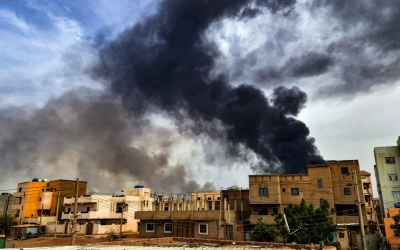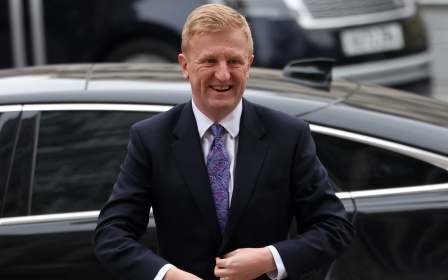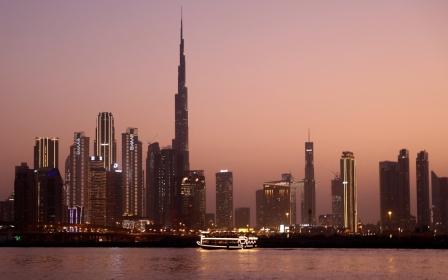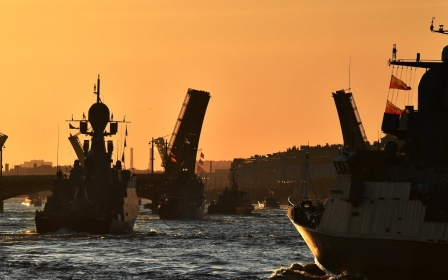Dubai holds former British marine on spying charges

A highly decorated former British marine has been arrested and held in Dubai for seven months after being accused of spying, The Times reported on Wednesday.
Matt Croucher, 40, was arrested in November last year and charged with “intentionally and illegally accessing a telecommunications network”.
Now a security consultant, Croucher was interrogated by security services in the United Arab Emirates about his purported links to the British Ministry of Defence and to UK intelligence agencies.
No further details were provided about who he was allegedly spying on.
In a statement, the former marine’s family said the case against him was “made up and ridiculous” and accused the UK’s Foreign Office of being “useless”.
New MEE newsletter: Jerusalem Dispatch
Sign up to get the latest insights and analysis on Israel-Palestine, alongside Turkey Unpacked and other MEE newsletters
Lawyers representing British nationals imprisoned in the UAE told Middle East Eye the case represented a “miscarriage of justice” and showed the Emirates once again “acting as an autocratic and oppressive regime with a penchant for torture”.
“The rule of law in the UAE is very nearly non-existent,” said Matthew Hedges, a British academic researcher who was also detained for seven months in Dubai, where he was tortured.
“Very clearly, the British Foreign Office has learnt no lessons from my experience, and this case once again shows its lack of respect for British nationals,” he told MEE.
Croucher served in Iraq and Afghanistan, where he was awarded the George Cross - Britain’s highest honour for gallantry - after throwing himself on a Taliban tripwire grenade to save fellow soldiers.
A close friend of the former marine, who is from Solihull in the West Midlands, told The Times that he was arrested on 4 November and put in prison, where he had to sleep on the floor because of serious overcrowding.
The friend said Croucher was interrogated for six hours by Dubai’s Criminal Investigation Department (CID) and accused of being a spy. He was then jailed for four days before being released under investigation.
Though there was insufficient evidence for Dubai’s public prosecutor to move forward with the espionage charges, authorities in the emirate confiscated Croucher’s phone, passport and internet banking access device, leaving him stuck in the country without any money.
The former marine, who lived in Dubai between 2014 and 2021, stopped off in the emirate to meet friends on his way home to the UK after a period working in Saudi Arabia and Qatar. It was during this visit that he was arrested.
After his release, he was told he had to report to a police station every week until 27 March, according to the Times report.
In their statement, Croucher’s family said: “We’re shocked at the set of circumstances which have played out over the last seven months. Matt was due to only be away for a couple of weeks, returning through Dubai after working in the Middle East on his way home.
“We don’t understand why it’s taking the Dubai authorities so long to process this case, being constantly told it should be resolved in a week or two, a case we believe to be made up and ridiculous.”
UAE-UK relations strained
The revelation that Dubai is holding a highly decorated former British marine comes at a sensitive time in relations between Britain and its major regional ally, the UAE.
There have been disagreements within the British government about UAE-backed plans to invest in London’s Heathrow airport and the Sizewell C nuclear power station in Suffolk.
'The United Arab Emirates disregards the rule of law, acting as an autocratic and oppressive regime with a penchant for torture'
- Rhys Davies, barrister
In January, the UK government’s Cabinet Office said that the stake in phone company Vodafone held by a United Arab Emirates-backed telecoms group posed a national security risk to Britain.
In March, the UAE’s attempt to buy the Telegraph media group was dealt a fatal blow after the UK proposed laws that ban foreign states or government officials from holding any direct stakes in newspaper assets.
A Conservative parliamentary source told MEE that during a meeting to discuss the Telegraph bid, Iain Duncan Smith, a Conservative MP and former leader of the party, described the UAE as an "authoritarian state that does not have a free press".
At the end of April, the UAE cancelled a series of meetings with British ministers after the Emiratis were accused of aiding the paramilitary Rapid Support Forces (RSF) in Sudan.
Middle East Eye has reported previously on the extensive network of support provided to the RSF by the UAE.
Sudanese, European and US diplomats have all told MEE that the UAE’s western allies have failed to put it under any real pressure over its involvement in Sudan’s war, which has been raging for over a year.
British nationals detained
Croucher is the latest in a series of high-profile cases involving British nationals detained for significant periods of time in the UAE.
Rhys Davies, a barrister at Temple Garden chambers who represents people imprisoned in the UAE, told Middle East Eye that Croucher's arrest "represents a miscarriage of justice".
"The United Arab Emirates disregards the rule of law, acting as an autocratic and oppressive regime with a penchant for torture. It is lamentable that the UK government fails to stand up to the UAE's actions,” he said.
“This incident is not isolated - we have campaigned for years regarding Ryan Cornelius, Charles Ridley and Zack Shahin, but the UK and US governments turn a blind eye, preferring financial gains from oil money tainted by human rights violations.”
'It does still make me angry. Very clearly the Foreign Office has learnt no lessons from my experience, and it shows its lack of respect for UK nationals'
- Matthew Hedges, former prisoner in Dubai
Cornelius, a British property developer, has been imprisoned in Dubai since 2008 over bank fraud allegations. The United Nations has called for his immediate release. Ridley, also a British businessman, is serving a 20-year sentence for fraud.
Shahin was kidnapped by Dubai’s state security in 2008 and is currently serving a 53-year prison sentence on charges of fraud and other financial crimes.
Matthew Hedges was a British PhD student, in the UAE on a research trip, when he was arrested at Dubai International Airport in May 2018 on suspicion of spying on behalf of the British government.
He told MEE that he was tortured by Emirati security services during his seven months in solitary confinement, where he was put on a cocktail of medication that included anti-depressants, anti-anxiety pills, sleeping pills and antihistamines.
Hedges was handed a life sentence, but then pardoned and released after an international outcry.
He said that even now, six years later, he remains dependent on a reduced dose of these drugs. He told MEE that he had also been threatened with rendition to Yemen or Eritrea, and that direct threats had been made against him and his family.
Hedges said that in the same prison, he was aware of an Emirati national who had been ziptied to a chair with a bag over his head for a whole year, after coming back from fighting for a militant group in Syria.
Claiming that the rule of law in the UAE is "very nearly non-existent”, Hedges pointed to the case of Issa bin Zayed al-Nahyan, a member of the Emirati royal family and half-brother of UAE ruler Mohammed bin Zayed, who was acquitted of torture charges.
A tape broadcast in the US media showed Issa bin Zayed apparently torturing an Afghan named Mohamed Shapoor in the desert at night, beating him, letting off rifle rounds close to his head and driving over him with a car. The Emirati royal denied the accusation.
Criticism of British government
Hedges remains frustrated and angry towards the British government over the way he was treated. He said he thought that Croucher’s case had now emerged in the press because the security consultant’s family “are either frustrated or feel they have no other option”.
“It did immediately trigger memories,” Hedges said of today's news reports. “It does still make me angry. Very clearly the Foreign Office has learnt no lessons from my experience, and it shows its lack of respect for UK nationals.
“This is a decorated military veteran; you think they would be doing everything they can to get him out,” he added.
Hedges characterised the response of the British government to his case as “first disinterested, then weak and finally desperate”, after his wife Daniela Tejada went to the press.
In September 2023, the Foreign Office formally apologised to Hedges after it was recommended to do so by the parliamentary ombudsman. The apology specifically recognised that the UK had not fully followed its “guidance on torture and mistreatment and that this failure has left you uncertain as to whether more could have been done on your behalf”.
Davies, the barrister, told MEE: “The UK consulate provides utterly ineffective assistance. Our experience shows that promised consular support is an illusion, with no meaningful aid actually provided.”
A spokesperson for Britain’s Foreign, Commonwealth and Development Office said: “We are supporting a British man in the UAE and are in contact with the local authorities.”
The UAE’s foreign ministry did not respond to MEE’s request for comment.
Middle East Eye delivers independent and unrivalled coverage and analysis of the Middle East, North Africa and beyond. To learn more about republishing this content and the associated fees, please fill out this form. More about MEE can be found here.






